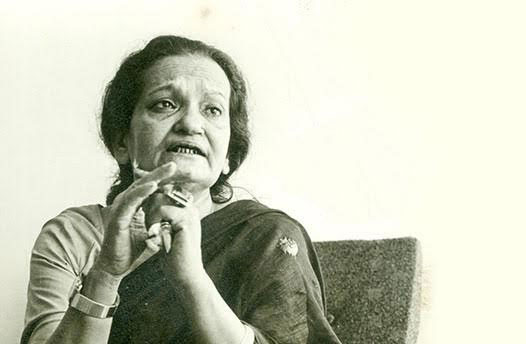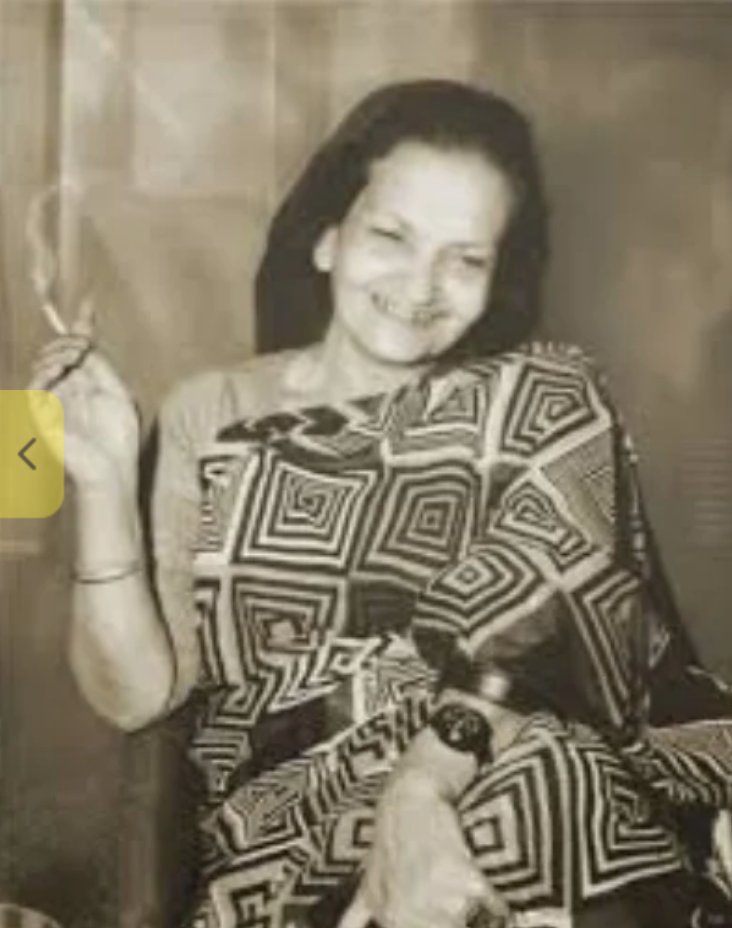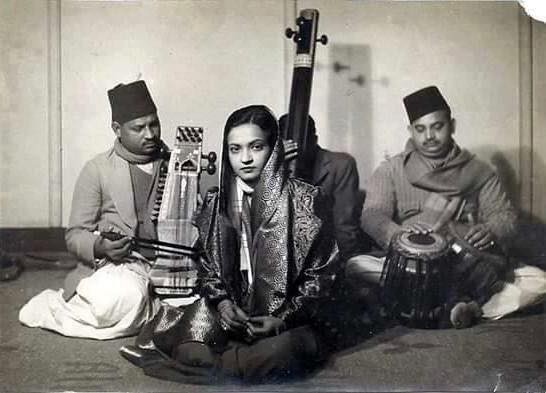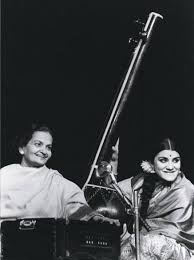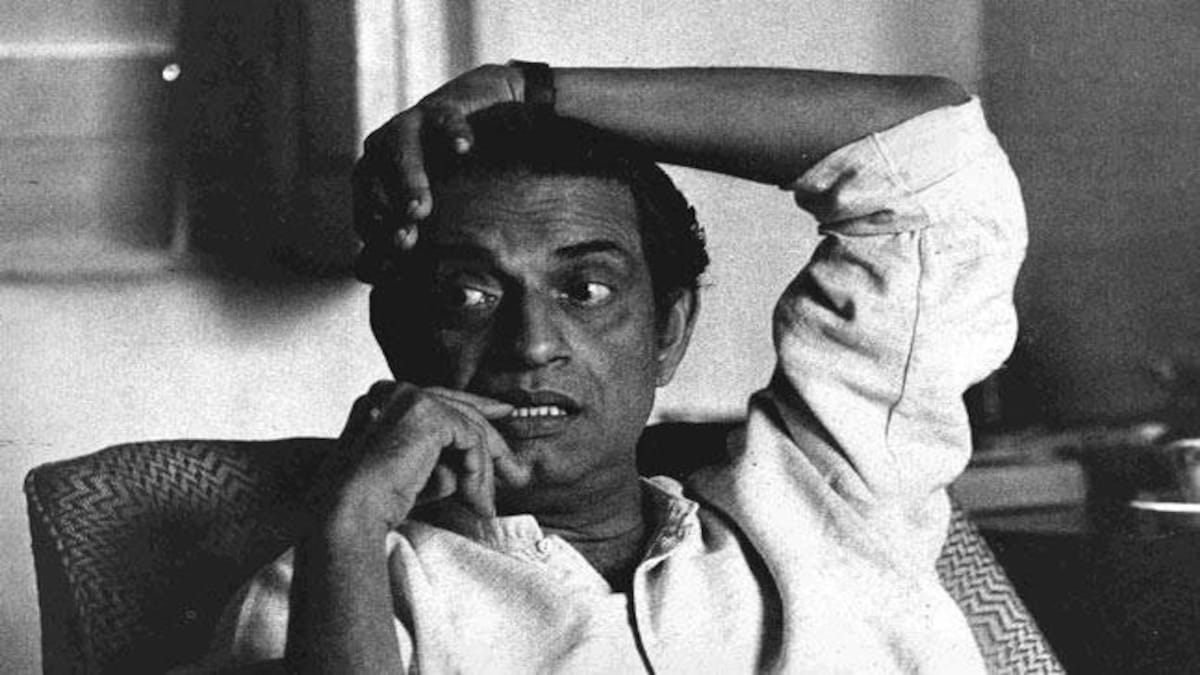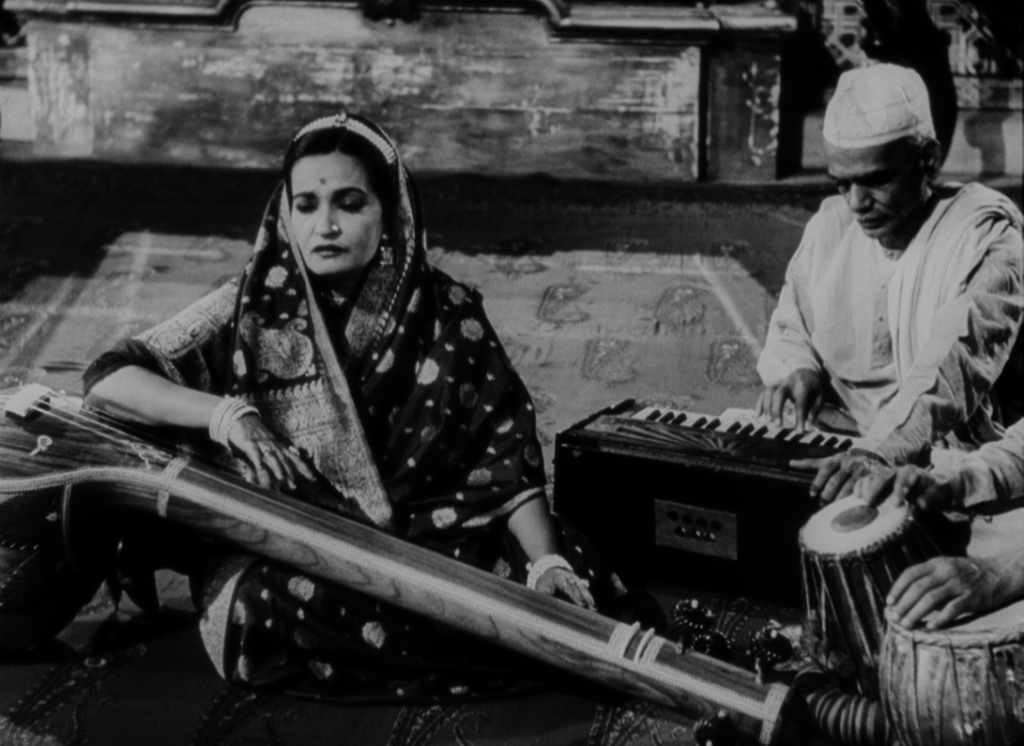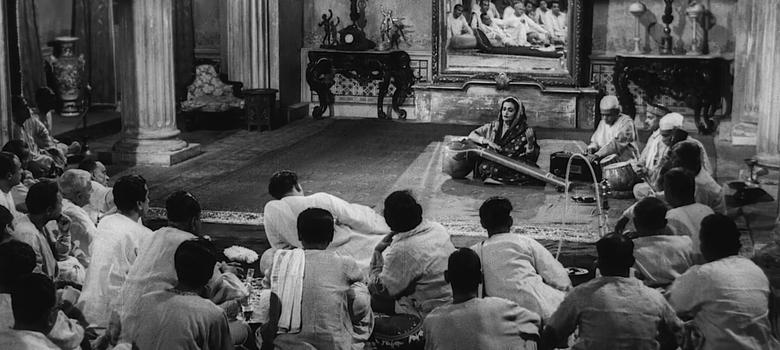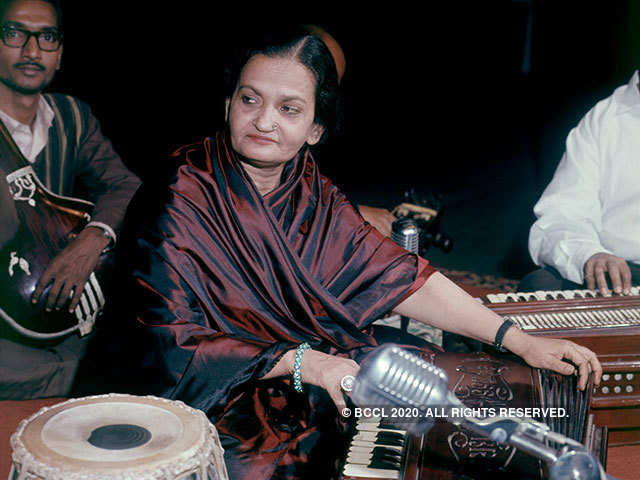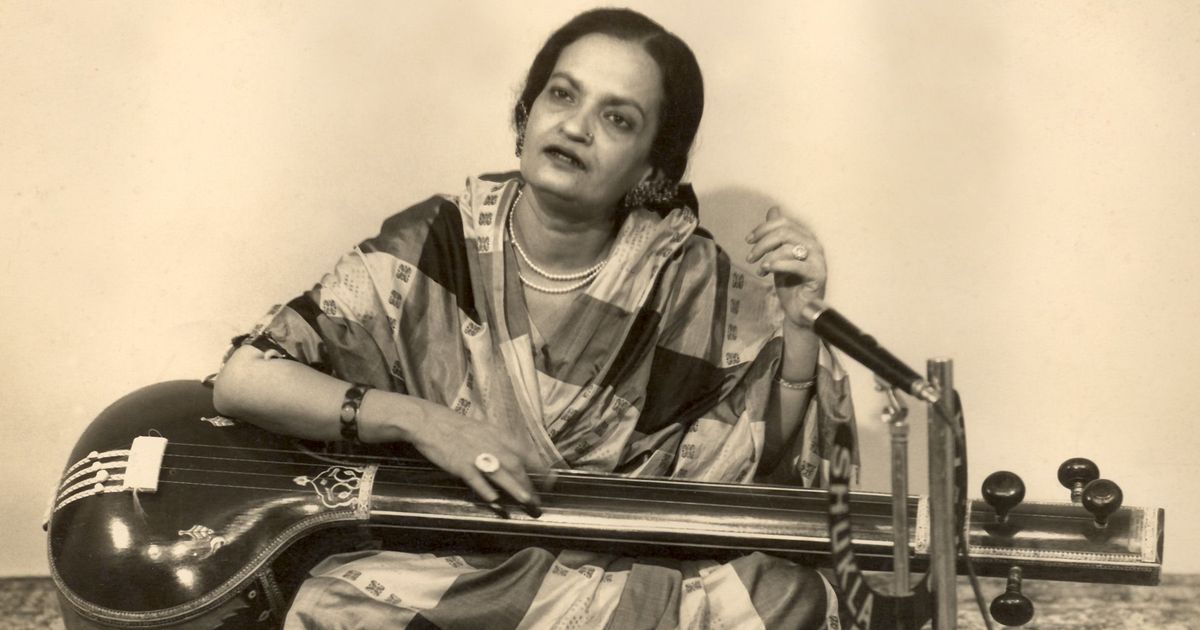Begum Akhtar: The Saddest Ghazal Singer In The World
When her twin sister Zohra died, depression became her earliest solace.
(thread)
When her twin sister Zohra died, depression became her earliest solace.
(thread)
Disclaimer inside: Imagine. https://medium.com/@manishgaekwad/begum-akhtar-the-saddest-ghazal-singer-in-the-world-15f49bcde908">https://medium.com/@manishga...
Begum Akhtar& #39;s twin sister Zohra died when she was four-years old.
Her estranged father& #39;s family fed poisoned balushahis to the two sisters. They were rushed to a hospital in an unconscious state.
When Bibbi, as Akhtar was called at home, woke up, she could not find Zohra.
Her estranged father& #39;s family fed poisoned balushahis to the two sisters. They were rushed to a hospital in an unconscious state.
When Bibbi, as Akhtar was called at home, woke up, she could not find Zohra.
& #39;Ammi, Zohra kahan hai?& #39;(Mother, where is Zohra?) she asked her mother, Mushtari Bai.
& #39;Woh Allah ke ghar gayi hai,& #39; (She has gone to god& #39;s house), Mushtari said, pointing heavenwards.
& #39;Woh Allah ke ghar gayi hai,& #39; (She has gone to god& #39;s house), Mushtari said, pointing heavenwards.
She gave Bibbi a white rumaal.
& #39;Zohra ka hai. Isse sambhal ke rakhna. Woh jab wapas aayegi, usse de dena,& #39; (This is Zohra& #39;s. Keep it safe. She will need it when she returns)
& #39;Zohra ka hai. Isse sambhal ke rakhna. Woh jab wapas aayegi, usse de dena,& #39; (This is Zohra& #39;s. Keep it safe. She will need it when she returns)
Bibbi took the handkerchief begrudgingly. She could not understand what happened.
She missed sitting on Zohra& #39;s back, riding her like a horse and screaming aloud.
The absence of her sister made Bibbi a quiet child. Depression became Bibbi& #39;s earliest solace.
She missed sitting on Zohra& #39;s back, riding her like a horse and screaming aloud.
The absence of her sister made Bibbi a quiet child. Depression became Bibbi& #39;s earliest solace.
Her mother enrolled her in singing classes to make her speak.
Bibbi& #39;s taleem (training) was tinged with sadness. She would keep Zohra& #39;s handkerchief next to her and hold on to it when the riyaz (practise) got tough.
Her voice soared into a wail.
Bibbi& #39;s taleem (training) was tinged with sadness. She would keep Zohra& #39;s handkerchief next to her and hold on to it when the riyaz (practise) got tough.
Her voice soared into a wail.
Mushtari did not stop Bibbi& #39;s heart from crying. Melancholy was opening her vocal chords.
Soon Bibbi was performing in mehfils and on stage in bit roles as an actor.
Her stage career was stalled after a king from a city in Bihar raped her.
Soon Bibbi was performing in mehfils and on stage in bit roles as an actor.
Her stage career was stalled after a king from a city in Bihar raped her.
She was only a girl when she became an unwed mother.
To shield Bibbi from shame, Mushtari told everyone that she had given birth to the newest member in the family.
A girl they named Shamima.
To shield Bibbi from shame, Mushtari told everyone that she had given birth to the newest member in the family.
A girl they named Shamima.
& #39;Tum sab ko kehna yeh tumhari behen hai, theek hai?& #39; (You have to tell people she is your sister, alright?), Mushtari said.
Bibbi nodded her head. She thought her sister Zohra had returned as Shamima, but Mushtari made sure to keep them emotionally apart.
Bibbi nodded her head. She thought her sister Zohra had returned as Shamima, but Mushtari made sure to keep them emotionally apart.
It was not good news for Bibbi& #39;s future to be attached to the newborn.
Mushtari veered Bibbi towards cinema.
Bibbi acted in films to accelerate her singing career but it did not take off.
Music composers said her dolorous voice was suited for funerals.
Mushtari veered Bibbi towards cinema.
Bibbi acted in films to accelerate her singing career but it did not take off.
Music composers said her dolorous voice was suited for funerals.
One day, her mother took her to meet a pir(saint).
& #39;Iski kismet saath nahi de rahi, kuch kariye Pir saab,& #39; (Her luck seems to have run out, do something pir saab) said Mushtari.
& #39;Log kehte hain yeh sirf allah ke pyare ke liye gaati hai.& #39; (People say she sings only for the dead)
& #39;Iski kismet saath nahi de rahi, kuch kariye Pir saab,& #39; (Her luck seems to have run out, do something pir saab) said Mushtari.
& #39;Log kehte hain yeh sirf allah ke pyare ke liye gaati hai.& #39; (People say she sings only for the dead)
The pir asked Bibbi to show him her notebook of songs.
She did as told. He asked her to open it to a page. She did.
He pointed to a ghazal written on the page.
& #39;Yeh wala gao& #39; (Sing this one), he said.
She did as told. He asked her to open it to a page. She did.
He pointed to a ghazal written on the page.
& #39;Yeh wala gao& #39; (Sing this one), he said.
It was a ghazal written by the poet Behzad Lakhnavi. It happened to be her favourite for riyaz.
Bibbi sang the ghazal with a piercing urgency in mehfils, concerts, on radio, and had it recorded on disc.
Bibbi sang the ghazal with a piercing urgency in mehfils, concerts, on radio, and had it recorded on disc.
In a mehfil, her mother could not help notice that the ghazal was making the men swoon.
& #39;Haye, gade murde bhi jag jaate hain,& #39; (Even the dead rise up) Mukhtari said, cracking her knuckles on her own head to bestow blessings on her gifted daughter.
& #39;Haye, gade murde bhi jag jaate hain,& #39; (Even the dead rise up) Mukhtari said, cracking her knuckles on her own head to bestow blessings on her gifted daughter.
Bibbi sang with her sister Zohra& #39;s handkerchief seated beside her. It gave her confidence.
At thirty-one, when she married late, her barrister husband& #39;s aristocratic lineage constrained her singing, where women from good families did not indulge in cheap entertainment.
At thirty-one, when she married late, her barrister husband& #39;s aristocratic lineage constrained her singing, where women from good families did not indulge in cheap entertainment.
Years passed in domesticity. She often began falling ill and had six miscarriages.
She kept to herself, murmuring and humming songs.
The doctors advised her to return to singing as the only remedy but she needed her husband& #39;s approval.
She kept to herself, murmuring and humming songs.
The doctors advised her to return to singing as the only remedy but she needed her husband& #39;s approval.
He said she should have done it years ago instead of trying to fit into the role of a housewife.
& #39;Aaj se tum azaad raho,& #39; (Live freely from today), he said, unfettering her from the burden of marital duties.
& #39;Aaj se tum azaad raho,& #39; (Live freely from today), he said, unfettering her from the burden of marital duties.
Singing a khayal, a dadra, a ghazal on All India Radio felt like the mike was an apparatus resuscitating her with good health.
She wept at the end of the recording, clutching strongly Zohra& #39;s handkerchief as if it was her sister& #39;s hand.
She wept at the end of the recording, clutching strongly Zohra& #39;s handkerchief as if it was her sister& #39;s hand.
She sniffled, wiping her nose with the same handkerchief as a source of relief.
Some years later, filmmaker Satyajit Ray met her for a thumri in his film Jalsaghar (The Music Room).
& #39;Main Bengali mein bhi gaa sakti hoon,& #39; (I can sing in Bengali), Bibbi said.
Some years later, filmmaker Satyajit Ray met her for a thumri in his film Jalsaghar (The Music Room).
& #39;Main Bengali mein bhi gaa sakti hoon,& #39; (I can sing in Bengali), Bibbi said.
She began humming Jochona Koreche Aari. https://www.youtube.com/watch?v=BQKNeO-ZQWg">https://www.youtube.com/watch...
& #39;No, no, I don& #39;t want any popular song,& #39; Ray said.
& #39;The situation in the film is a janeu ceremony. It demands a festive song but I want something imbued with grief. It needs to be beautiful but ironic, joyous but tearful.& #39;
& #39;The situation in the film is a janeu ceremony. It demands a festive song but I want something imbued with grief. It needs to be beautiful but ironic, joyous but tearful.& #39;
Bibbi was hoping to sing a popular thumri.
She mentioned Piya Nahi Aaye, Jab Se Shyam Sidhare, Na Ja Balam Pardes, but Ray would have none of it.
& #39;No, no, no,& #39; he said. & #39;Which is your least-known thumri?& #39;
& #39;Sab,& #39; (All of them) she said.
She preferred singing ghazals.
She mentioned Piya Nahi Aaye, Jab Se Shyam Sidhare, Na Ja Balam Pardes, but Ray would have none of it.
& #39;No, no, no,& #39; he said. & #39;Which is your least-known thumri?& #39;
& #39;Sab,& #39; (All of them) she said.
She preferred singing ghazals.
She could mould her one-octave range without straining her pitch.
At a studio in Calcutta, a regal crystal chandelier was lit with yellow candles. It danced in the wall-length mirror across the red-carpeted room. The room was fumigated with the sweet-vanilla lobaan scent.
At a studio in Calcutta, a regal crystal chandelier was lit with yellow candles. It danced in the wall-length mirror across the red-carpeted room. The room was fumigated with the sweet-vanilla lobaan scent.
Bibbi, wearing a pearl headband, a red bindi, chainmail earrings, an emerald-encrusted necklace, bangles, and her dazzling diamond nosepin, wrapped her head in her maroon Banarasi saree& #39;s gold-border pallu.
She strummed the tanpura, sitting along side her musicians on the tabla and the harmonium.
She exuded the decadence of zamindaari (feudal landowner)patronage without frills and concerned only with her star presence amongst keen listeners.
https://www.youtube.com/watch?v=bYZ__QC6SgE">https://www.youtube.com/watch...
She exuded the decadence of zamindaari (feudal landowner)patronage without frills and concerned only with her star presence amongst keen listeners.
https://www.youtube.com/watch?v=bYZ__QC6SgE">https://www.youtube.com/watch...
As she sang Bhar Bhar Aayi Mori Akhiyan, she noticed an actor was instructed to snort tobacco and use a handkerchief for relief.
Watching him, she realised Zohra was missing; her handkerchief companion was absent from this music room.
Watching him, she realised Zohra was missing; her handkerchief companion was absent from this music room.
Bibbi was so uninspired to perform that she had forgotten to carry the handkerchief.
What could Bibbi do now? Could Zohra’s absence deepen the melancholy required for the rendition?
She requested for another take.
What could Bibbi do now? Could Zohra’s absence deepen the melancholy required for the rendition?
She requested for another take.
When she saw the man dab his mouth again, she thought of it as a sign to let go of Zohra. Could she ever not be without her twin?
Bhar bhar aayi mori akhiyan, she applied the khatka and the taan but nothing seemed to bring tears to her dry eyes. She sang the thumri in a state of trance; one where she was floating in dispassionately.
After the performance, there was no applause. The director had not included it in the scene.
With Zohra not beside her, with no appreciation for her performance, she felt out of place.
Something was amiss, even cold, but she was in a daze to register its chilling intensity.
With Zohra not beside her, with no appreciation for her performance, she felt out of place.
Something was amiss, even cold, but she was in a daze to register its chilling intensity.
The experience numbly darkened the colour of her existential sorrow.
She decided never to appear on film again. Jalsaghar was released and did not make a noise. It made no difference to her fame.
She decided never to appear on film again. Jalsaghar was released and did not make a noise. It made no difference to her fame.
Many years later, while performing at a concert in Kerala, she raised her pitch and felt a tear in her voice.
It had begun to crack. She coughed into Zohra’s handkerchief and noticed red spots of blood.
Sadness had an undeniable bright hue.
It had begun to crack. She coughed into Zohra’s handkerchief and noticed red spots of blood.
Sadness had an undeniable bright hue.
She was dying of excess.
Drinking, smoking, loneliness, and the demands of the job, she was using all of it to obliterate the pain she felt within. It crystallised in her radiant, heart-wrenching voice.
Drinking, smoking, loneliness, and the demands of the job, she was using all of it to obliterate the pain she felt within. It crystallised in her radiant, heart-wrenching voice.
Ray, who had always heard her on disc and never in a mehfil, walked into a private mehfil in Ahmedabad where Bibbi was performing.
She had just finished singing a ghazal written by poet Shakeel Badayuni. https://www.youtube.com/watch?v=XYgG6SiX7ZE">https://www.youtube.com/watch...
She had just finished singing a ghazal written by poet Shakeel Badayuni. https://www.youtube.com/watch?v=XYgG6SiX7ZE">https://www.youtube.com/watch...
mere ham-nafas mere ham-navā mujhe dost ban ke daġhā na de
maiñ huuñ dard-e-ishq se jāñ-ba-lab mujhe zindagī kī duā na de
***
My friend, my companion, do not deceive me in your company
I am already wounded in love, do not give me the hope of life
maiñ huuñ dard-e-ishq se jāñ-ba-lab mujhe zindagī kī duā na de
***
My friend, my companion, do not deceive me in your company
I am already wounded in love, do not give me the hope of life
Spotting him, she coughed, cleared her wheezy chest and said, ‘Aur yeh ek aakhri ghazal pesh hai ek khaas dost ke liye, jinka jab bhi zikr hoga, reham se hamey bhi yaad kiya jaayega.’ (And this last ghazal is for a special friend, who when remembered, will also remind you of me.)
As she sang the first couplet, the music room roared with cries of wah-wah and claps.
dīvāna banānā hai to dīvāna banā de
varna kahīñ taqdīr tamāsha na banā de
***
Make me sound crazy if you want to
Or fate will make a show out of me
dīvāna banānā hai to dīvāna banā de
varna kahīñ taqdīr tamāsha na banā de
***
Make me sound crazy if you want to
Or fate will make a show out of me
Ray was stunned by the reception.
He had downplayed it in the film.
This was the response Bibbi was used to.
It replenished the vigour in the throw of her fading voice.
This was the ghazal she had turned the page to in her book of lyrics.
He had downplayed it in the film.
This was the response Bibbi was used to.
It replenished the vigour in the throw of her fading voice.
This was the ghazal she had turned the page to in her book of lyrics.
The ghazal the pir said would immortalise her.
Bibbi sang full-throated for one last time. Zohra’s handkerchief sat beside her.
Four days after the mehfil, Bibbi dreamt she was with her twin sister in heaven. https://www.youtube.com/watch?v=sG6dK3a1dyk">https://www.youtube.com/watch...
Bibbi sang full-throated for one last time. Zohra’s handkerchief sat beside her.
Four days after the mehfil, Bibbi dreamt she was with her twin sister in heaven. https://www.youtube.com/watch?v=sG6dK3a1dyk">https://www.youtube.com/watch...

 Read on Twitter
Read on Twitter